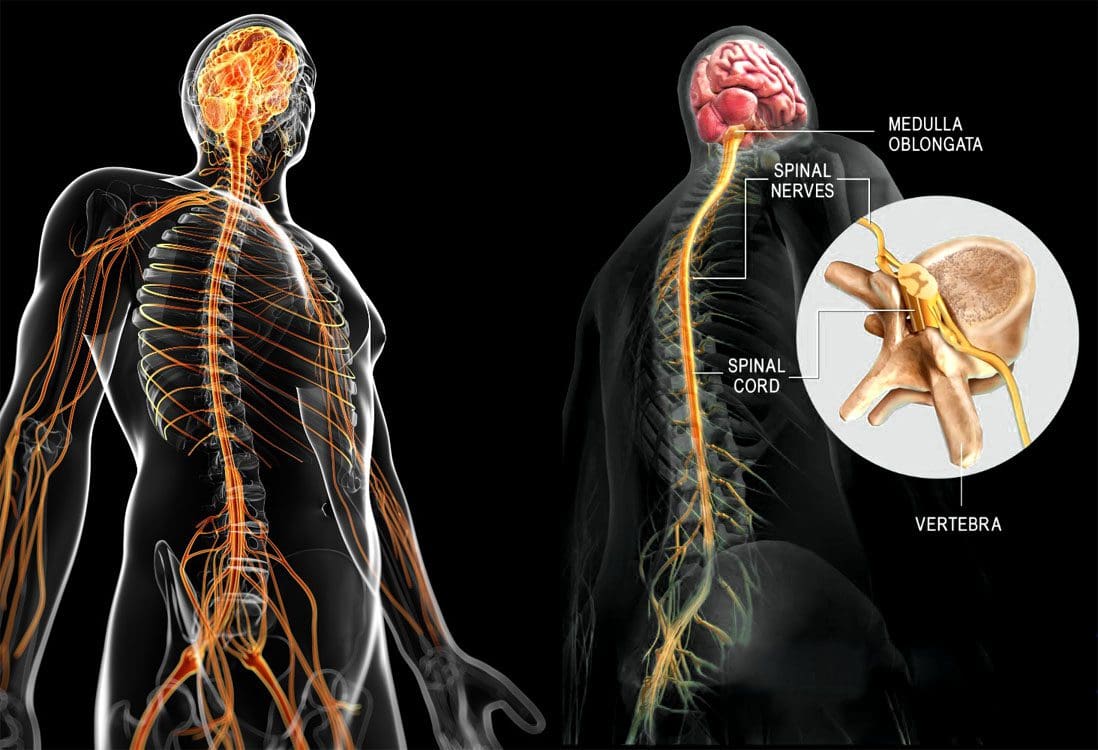The spine consists of multiple vertebral bones separated by gel-like discs. The discs are the shock absorbers, cushioning the vertebrae. Normal wear and tear, underlying conditions, and injuries can cause the discs to crack, tear, and leak out, also known as a slipped or herniated disc, which is the most common cause of sciatica. In certain cases, physicians are using a medication that is used to control seizures known as gabapentin. Gabapentin is an anticonvulsant used to treat nerve-related back pain, like sciatica.
Table of Contents
First Line Medications
- Doctors’ first-line medications for sciatica include anti-inflammatories/NSAIDs such as naproxen or ibuprofen and corticosteroids.
- Back spasms can accompany sciatica, increasing the sensations and pain; a muscle relaxer could be added.
- If these treatments do not provide adequate symptom relief, a combination of gabapentin, naproxen, ibuprofen (NSAIDs), corticosteroids, and Tylenol could be recommended.
- Before going to bed is the recommended time for taking the meds because of the potential for drowsiness.
- This allows the patient to be more comfortable and get better sleep.
Gabapentin
Gabapentin is a non-narcotic prescription medication that is part of the anticonvulsant family. FDA approved for the following:
Seizures
- It can be used with other medications for controlling epileptic seizures.
Postherpetic Neuralgia
- Painful blisters caused by reactivation of herpes zoster virus, aka shingles.
Off-label uses include:
Nerve Pain
- Treats sharp burning nerve pain often experienced from:
- Shingles outbreak
- Diabetes
- Spinal cord injury
Restless Legs Syndrome
- Manages the various sensations commonly experienced with the condition.
Fibromyalgia
- It can be effective in treating pain symptoms.
Brain Signals
Gabapentin alters the way the brain and body transmit signals. It works by blocking the pain-causing neurotransmitters to calm the pain signals to the nerves. This is why it is used for sciatica and neurogenic pain. Individuals dealing with nerve pain, numbness, and tingling in the legs from sciatica or have diabetic neuropathy benefit the most. It is not recommended for chronic, non-specific low back pain. Gabapentin may take up to a month to provide maximum relief; individuals may start to experience some relief within the first week. However, notify a physician if significant pain persists after using Tylenol, NSAIDs, corticosteroids, and gabapentin.
What To Expect
- The medication is available in a capsule, tablet with immediate or extended release, and liquid form.
- Starting dosage is 300mg once a day.
- A physician may increase the dosage up to three times a day.
- The medication needs to be taken as prescribed.
- Treating neuropathic sciatic pain with gabapentin is standard practice.
- This is an off-label usage meaning the FDA has not determined if the medication is safe and effective for sciatica.
Side Effects and Interactions
The most common side effects include:
- Dizziness
- Fatigue
- Tremors
Due to these potential side effects, Individuals should not drive or operate heavy machinery while taking gabapentin.
Rare but more serious side effects can include:
- Vision changes
- Confusion
- Trouble breathing
- Behavioral changes or suicidal ideation
- Swelling
In 2019, the FDA released a statement cautioning the elderly and those with significant breathing conditions, such as chronic obstructive pulmonary disease/COPD, to use extreme caution when taking gabapentin and similar medications. Elderly individuals are more likely to experience side effects due to age-related changes, decreased kidney function, poor balance, and mobility issues. There is an increased risk of experiencing breathing problems when taking gabapentin with any of the following:
- Alcohol
- Opioids
- CNS/Central Nervous System depressants slow brain activity for sleep, anxiety, and panic disorders.
The consumption of alcohol, opioids, or CNS depressants while taking gabapentin can increase the sedating effects of each substance and lead to respiratory depression. It is imperative that your physician knows all prescription and non-prescription medications, herbal supplements, and vitamins to prevent negative interactions between medications.
Does Gabapentin Work?
References
Center for Drug Evaluation and Research. (n.d.). Serious breathing difficulties with gabapentin and pregabalin. U.S. Food and Drug Administration. Retrieved September 30, 2022, from https://www.fda.gov/drugs/drug-safety-and-availability/fda-warns-about-serious-breathing-problems-seizure-and-nerve-pain-medicines-gabapentin-neurontin
Grice, Gloria R, and Marsha K Mertens. “Gabapentin as a potential option for treatment of sciatica.” Pharmacotherapy vol. 28,3 (2008): 397-402. doi:10.1592/phco.28.3.397
U.S. Department of Health and Human Services. (2022, March 22). Prescription CNS depressants DrugFacts. National Institutes of Health. Retrieved September 30, 2022, from https://nida.nih.gov/publications/drugfacts/prescription-cns-depressants
U.S. National Library of Medicine. (n.d.). Gabapentin: Medlineplus drug information. MedlinePlus. Retrieved September 30, 2022, from https://medlineplus.gov/druginfo/meds/a694007.html
U.S. National Library of Medicine. (n.d.). Pregabalin: Medlineplus drug information. MedlinePlus. Retrieved September 30, 2022, from https://medlineplus.gov/druginfo/meds/a605045.html
Yasaei R, Katta S, Saadabadi A. Gabapentin. [Updated 2022 May 2]. In: StatPearls [Internet]. Treasure Island (FL): StatPearls Publishing; 2022 Jan-. Available from: https://www.ncbi.nlm.nih.gov/books/NBK493228/
Post Disclaimer
Professional Scope of Practice *
The information herein on "Gabapentin Medication For Sciatica: Chiropractic Scientist" is not intended to replace a one-on-one relationship with a qualified health care professional or licensed physician and is not medical advice. We encourage you to make healthcare decisions based on your research and partnership with a qualified healthcare professional.
Blog Information & Scope Discussions
Welcome to El Paso's Premier Wellness, Personal Injury Care Clinic & Wellness Blog, where Dr. Alex Jimenez, DC, FNP-C, a Multi-State board-certified Family Practice Nurse Practitioner (FNP-BC) and Chiropractor (DC), presents insights on how our multidisciplinary team is dedicated to holistic healing and personalized care. Our practice aligns with evidence-based treatment protocols inspired by integrative medicine principles, similar to those found on this site and our family practice-based chiromed.com site, focusing on restoring health naturally for patients of all ages.
Our areas of multidisciplinary practice include Wellness & Nutrition, Chronic Pain, Personal Injury, Auto Accident Care, Work Injuries, Back Injury, Low Back Pain, Neck Pain, Migraine Headaches, Sports Injuries, Severe Sciatica, Scoliosis, Complex Herniated Discs, Fibromyalgia, Chronic Pain, Complex Injuries, Stress Management, Functional Medicine Treatments, and in-scope care protocols.
Our information scope is multidisciplinary, focusing on musculoskeletal and physical medicine, wellness, contributing etiological viscerosomatic disturbances within clinical presentations, associated somato-visceral reflex clinical dynamics, subluxation complexes, sensitive health issues, and functional medicine articles, topics, and discussions.
We provide and present clinical collaboration with specialists from various disciplines. Each specialist is governed by their professional scope of practice and their jurisdiction of licensure. We use functional health & wellness protocols to treat and support care for musculoskeletal injuries or disorders.
Our videos, posts, topics, and insights address clinical matters and issues that are directly or indirectly related to our clinical scope of practice.
Our office has made a reasonable effort to provide supportive citations and has identified relevant research studies that support our posts. We provide copies of supporting research studies upon request to regulatory boards and the public.
We understand that we cover matters that require an additional explanation of how they may assist in a particular care plan or treatment protocol; therefore, to discuss the subject matter above further, please feel free to ask Dr. Alex Jimenez, DC, APRN, FNP-BC, or contact us at 915-850-0900.
We are here to help you and your family.
Blessings
Dr. Alex Jimenez DC, MSACP, APRN, FNP-BC*, CCST, IFMCP, CFMP, ATN
email: coach@elpasofunctionalmedicine.com
Multidisciplinary Licensing & Board Certifications:
Licensed as a Doctor of Chiropractic (DC) in Texas & New Mexico*
Texas DC License #: TX5807, Verified: TX5807
New Mexico DC License #: NM-DC2182, Verified: NM-DC2182
Multi-State Advanced Practice Registered Nurse (APRN*) in Texas & Multi-States
Multistate Compact APRN License by Endorsement (42 States)
Texas APRN License #: 1191402, Verified: 1191402 *
Florida APRN License #: 11043890, Verified: APRN11043890 *
License Verification Link: Nursys License Verifier
* Prescriptive Authority Authorized
ANCC FNP-BC: Board Certified Nurse Practitioner*
Compact Status: Multi-State License: Authorized to Practice in 40 States*
Graduate with Honors: ICHS: MSN-FNP (Family Nurse Practitioner Program)
Degree Granted. Master's in Family Practice MSN Diploma (Cum Laude)
Dr. Alex Jimenez, DC, APRN, FNP-BC*, CFMP, IFMCP, ATN, CCST
My Digital Business Card
RN: Registered Nurse
APRNP: Advanced Practice Registered Nurse
FNP: Family Practice Specialization
DC: Doctor of Chiropractic
CFMP: Certified Functional Medicine Provider
MSN-FNP: Master of Science in Family Practice Medicine
MSACP: Master of Science in Advanced Clinical Practice
IFMCP: Institute of Functional Medicine
CCST: Certified Chiropractic Spinal Trauma
ATN: Advanced Translational Neutrogenomics





 Again, We Welcome You.
Again, We Welcome You.
Comments are closed.